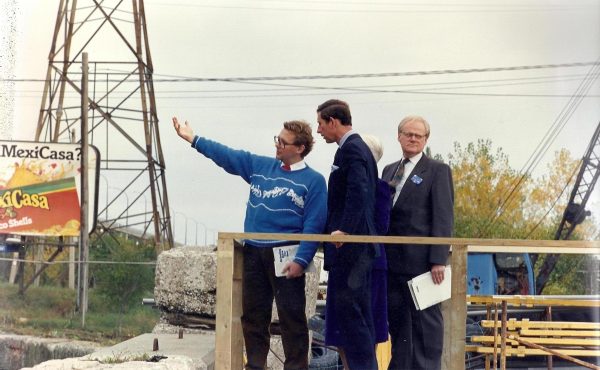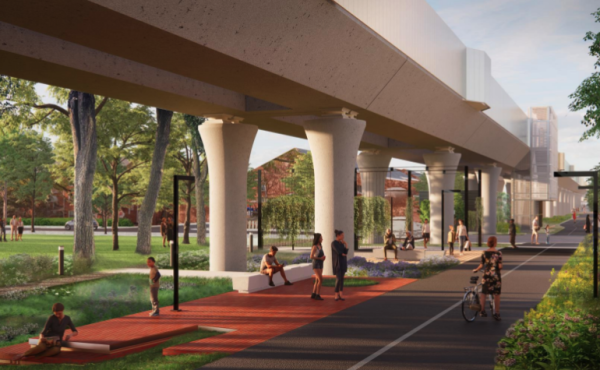• Don’t blame Miller, it’s not his fault [ Toronto Star ]
• Sidewalk’s missing link tricky to wheel around [ Toronto Star ]
• Right wing wins a battle [ Toronto Star ]
• City council: No guts but plenty of poo [ Toronto Star ]
• Miller to launch new search for funds [ Globe and Mail ]
• Tories to delay by-elections [ Globe and Mail ]
• Graffiti alive [ BlogTO ]
• Oak Ridges to stay as park [ Toronto Sun ]
• Project recycles trash gas [ Toronto Sun ]
• Council hits the woof [ Toronto Sun ]
Monday’s Headlines
By Julie Yamin
Read more articles by Julie Yamin




9 comments
It’s so tragic to see how some of the deferrers are speaking with the giddy anticipation of fledgling revolutionaries, when in reality they are just canceling citizens’ dreams.
This is what happens when people stop being simple, decent and independent and instead start trying to be great strategists. The reason that people like Napoleon were so rare is that strategy is quite difficult and anticipating the actions of opponents and allies alike is damn-near impossible for most people. If it wasn’t, we’d all be a lot better a chess.
Maybe we should blame it on “Survivor” where any gasoline attendant can create allegiances and for a month pretend to be Alexander the Great. Just like all security guards want to act like cops, all councillors want to act like MPs. Well, that’s not exactly correct. What they really want is to act like American Congressmen, the kind they see on the West Wing DVDs that they’re watching nightly, notepads in hand.
Municipal government really is the sandbox of politics and who’s play in the sandbox? Children. They fight and throw things and steal each others toys. What I’m wondering is, where’s the principal to come and break up this mess? Our councillors, who can’t even behave long enough to have a picture taken, clearly need a strong hand leading them.
The damage their childish attempts at strategy (“Let’s fuck ourselves over so bad the province will have to bail us out.”) will do to this city is immeasurable. We’d be lucky if it only set up back a couple decades. At worse, we may have just witnessed the beginning of the end.
But again, I ask…who’s driving this underfunded bus?
Kevin
The City bureaucracy proposed taxes. It invited citizens to comment on them – the Mayor was too busy to show. They said “we don’t want the land transfer tax and the $40 car tax”. The bureaucracy went to the Executive and got them to pass a car tax 50% higher than the ones the citizens opposed, and the LTT.
Whose dreams were cancelled? I think it was the citizens who thought they were being consulted – but as citizens of Lansdowne Avenue found out, consultation ain’t what it used to be.
Ontario has granted taxing powers – but not in sales tax or income tax – taxes that at a stroke could fix the budget gap and allow a reduction in property taxes to fix the discrepancies that have existed since amalgamation which have been an ongoing political third-rail at city hall.
Instead it offers nickels and dimes. “Charge what you like” they say, “as long as you vote Liberal in October”.
So instead of taxing the poor little car owners $60/year, or asking the real estate speculators to give up a tiny fraction of the obscene profits they’re making in the crazy housing market, once again transit users will be expected to cough up a fare increase that will likely cost TTC users much more than $60/year each.
What is the point of inviting the public to comment on proposed taxes. Can you imagine any proposed tax that wouldn’t be vociferously opposed? Leadership means doing the right thing for the city and not folding at the first sign of opposition. Lansdowne is actually a really good example of political leadership.
blarg – to answer your last point first – leadership means doing what you say you’re going to. That means if you say there’s going to be consultation – mean it. Giambrone has never squared the overwhelming impression of his constituents with his “door to door survey”.
If you tax the car owners enough, since that $60 is not going to stay $60, they aren’t going to take transit. They’re going to say, well hell if I’m going to pay all this tax I’m going to get my money’s worth and start driving downtown.
I own a metropass and a car for weekend use. I pay $130 or so for a parking pad which I inherited when I bought the house. The equation for which mode is more worthwhile has changed with the Tory tax credit but could change again.
Taxing parking or access to downtown is superior, because it allows you to impose differential taxes on the parts of the city where congestion is most severe. London’s congestion charge worked because it transferred money directly from those who drove to those who took transit. This tax is unfair because it taxes possession rather than use.
Similarly on land transfer tax. Let’s take a house. If I am a first time buyer and I buy a second hand house, I pay the full amount anyone else would. No extra costs are incurred by the city – it’s merely changing hands. My first house involved my handing over about $3,000 to Ontario for the privilege – with market inflation and a Toronto tax that will be nearer 8,000-10,000 next time.
The mistake people make in thinking a tax will just “come out of the seller’s end” is that the seller is likely buying their next house and is depending on the proceeds of the last one.
If the owner razes it and builds condos, I get a $2000 maximum LTT exemption for the transaction and if the developer plays his cards right, he gets exemptions from development charges even though there is now more people on the same land – more transit, more hydro, more sewer. There are environmental costs to both the demolition and the rebuilding which are limited to some refurbishment in a used house.
Imposing a land transfer tax only obscures the fact that Toronto is not getting its due from the building boom. We need to ensure that developers, adding to the built environment, are paying the extra costs they are imposing.
If you tax the car owners enough, since that $60 is not going to stay $60, they aren’t going to take transit. They’re going to say, well hell if I’m going to pay all this tax I’m going to get my money’s worth and start driving downtown.
Mark, the economic evidence points to this particular point being wrong. Automobile use has been shown to be pretty demand inelastic – that’s why the recent dramatic increase in gas prices hasn’t made a dent in the number of cars on the road. It’s very unlikely that a $5/month increase in the cost of car ownership would result in much of a change in use, plus or minus.
Regardless, I think the debate over how to tax auto use comes down to more practical considerations. What kind of tax is going to:
– be quick to implement
– demonstrate quick results, and
– be politically palatable for voters Etobicoke to Scarborough?
None of the tax-per-use options would raise enough money to make significant improvements to transit, especially not in the short term. London had it easy because they could use the congestion charge money to improve bus service immediately. Most of TO’s downtown service is by train, subway and streetcar, and the planning window for improvements to those is 5 to 10 years out.
I agree that some kind of tolls or parking tax will make sense eventually, but rush hour transit service needs a lot more capacity before that happens. If we implement those kind of taxes now I predict we’ll see voter backlash, possibly a botched implementation, and the whole process of developing smarter municipal tax policies will be set back 10 years. The car tax is simple to implement and pretty immune to arguments that it will destroy business in the downtown core (the sort of thing that plays well to voters).
I think the $60/year car tax is a well-thought-out little bit of public policy. It deserved to pass, and it almost did.
The parking tax would’ve been beauty. Why didn’t they go with that? It should be applied to all forms of parking, commercial, free, parkade, residential – whatever. And it should be applied across the city, not just downtown and North York as Miller had suggested.
Unlike road tolls it wouldn’t require additional infrastructure. It would have the added benefit of encouraging better community land-use patterns -i.e. less vast parking lots at malls, etc. and more walkable, bikable communities. Not only that but, as it is, the rest of us are subsidizing those who get the untaxed perk of free parking at their workplace. How fair is that? Oh, and then there’s the urban heat island effect and increased stormwater runoff exacerbated by acres of blacktop.
mobius – one reason could be that one of the biggest operators of parking in the City of Toronto is… the City of Toronto, via the Toronto Parking Authority. In my view, offstreet TPA lots should be privatised and the ensuing capital revenue put into transit infrastructure, with TPA retaining responsibility for on-street parking only.
Let’s separate from Toronto, the communist island.
We want again the former municipalities, where councillors were accountable locally.
Separation referendum, anyone ?